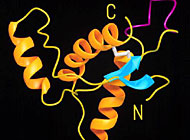Research offers hope for BSE vaccine

Swiss and Italian scientists have created immune cells in mice, which can recognise abnormal prion proteins. The research suggests that vaccines could be used for fighting prion diseases such as scrapie, which has affected many sheep, BSE and variant Creutzfeldt-Jakob disease in humans.
For the past 200 years, vaccination has proved the most effective way of controlling the agents, which cause infectious diseases. However, there has been little evidence that vaccines might be effective for protection against prion-related disorders.
“It has never been possible to elicit a strong immune response against prions,” professor Adriano Aguzzi from the Institute for Neuropathology of Zurich University Hospital told swissinfo. “Therefore it was never possible to find out whether vaccines might be effective in the case of prions.”
“We generated mice which spontaneously develop an immunity against prions by reprogramming their lymphocytes to make anti-prion antibodies.
“When scrapie was injected into the abdomen of these mice, we found that they were protected against prions. The study demonstrates that it makes sense to try and develop a vaccine.”
Prions are protein particles that are believed to cause brain diseases such as Creutzfeldt-Jakob. Scientists and researchers have had difficulty detecting them under a microscope, and the particles are hard to destroy.
Immune tolerance
Experimental vaccines against prions in mice have been hampered by the fact that the body also contains normal versions of prion proteins and is therefore immune tolerant to their presence.
“We used a pretty sophisticated genetic trick to induce immunity,” said Aguzzi. “For a vaccine, a simple system will be needed. We are not there yet but personally I am pretty optimistic that there will be ways to do that.
“The next step will be to devise systems which circumvent the tolerance of the normal prion proteins and so find ways to elicit a protective immune response.”
The research, which was published in the latest issue of the American journal, Science, was the result of collaboration between the institutes of Neuropathology, Laboratory Animal Science and Experimental Immunology of Zurich University Hospital, the Zurich-based company, Prionics, and the European Molecular Biology laboratory in Rome.
The Institute of Neuropathology’s main topic of research is the attempt to understand the intricate process by which infectious prions, once they have entered the body of a victim, march towards the brain and finally provoke disease within the central nervous system.
by Vincent Landon

In compliance with the JTI standards
More: SWI swissinfo.ch certified by the Journalism Trust Initiative
You can find an overview of ongoing debates with our journalists here . Please join us!
If you want to start a conversation about a topic raised in this article or want to report factual errors, email us at english@swissinfo.ch.